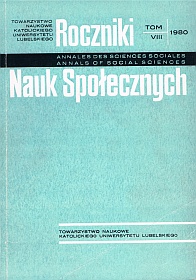The Socio-Religious Conditions of the Development of the Polish National Catholic Church in the Diocese of Sandomierz in the Years 1929-1939
Abstract
The adoption of the programme principles and organizational forms of the Polish National Catholic Church occurred in an unusually favourable social, economic and political situation. The relations between the State and the Roman Catholic Church during the acute economic crisis of the 1930s led to anticlericalism. The peasant and worker population, socially deprived, poorly informed and religiously disoriented, sought ways to improve their social status. They hoped to achieve this by weakening the position of those who owned great estates and whose living standards contrasted sharply with their own. „Sore points” arose in many locations, in the form of reorganization of existing Roman Catholic parishes as posts of the National Church; the latter opposed the ideology and especially the organization of the Roman Catholic Church. The occurrence of many bitter conflicts, the impulse of self-defence and even attacks against the leaders of „Hodurism” are easy to understand in the context of the lively activities of Polish National Catholic priests which undermined the influence of the Roman Catholic clergy. The task of Roman Catholic priests was facilitated by the concordate, which provided for the secular arm’s assistance to the Roman Catholic Church in case of need and under specific circumstances. Because of the disintegrating centrifugal forces and of the practical consequences of the lack of legal recognition, the development of the Polish National Catholic Church and establishment of parishes as its basic and autonomous administrative units was accompanied by an almost simultaneous process of decline.
Copyright (c) 1980 Roczniki Nauk Społecznych

This work is licensed under a Creative Commons Attribution-NonCommercial-NoDerivatives 4.0 International License.


